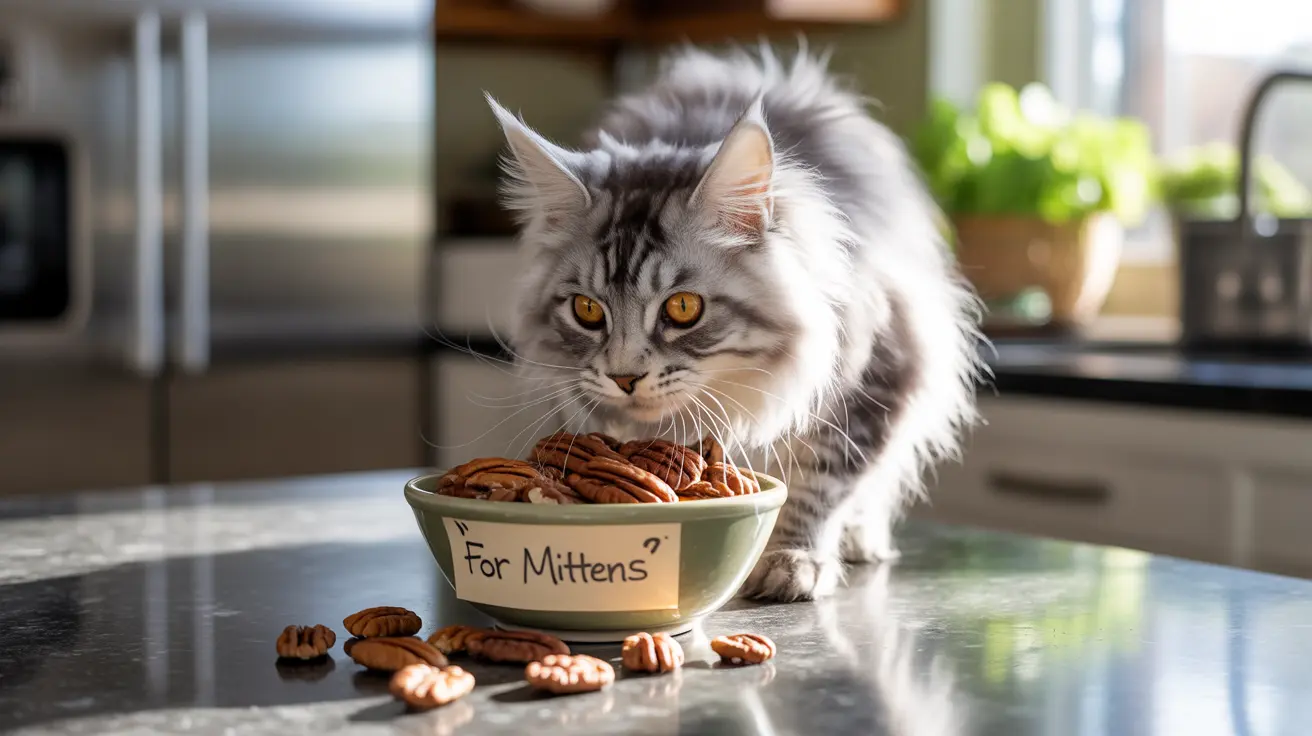As a cat owner, you may wonder about the safety of sharing human foods with your feline friend, particularly nuts like pecans. While cats might show interest in these crunchy treats, it's crucial to understand the potential risks and implications of feeding pecans to cats.
In this comprehensive guide, we'll explore whether cats can safely consume pecans, the associated health risks, and what you should do if your cat accidentally eats them.
The Safety of Pecans for Cats
While pecans aren't technically toxic to cats, they're not recommended as part of a feline diet. Cats are obligate carnivores, meaning their bodies are designed to process and utilize nutrients primarily from meat sources. Their digestive systems aren't equipped to handle nuts effectively, which can lead to various health issues.
Potential Health Risks of Pecans for Cats
Digestive Issues
The high fat content in pecans can cause significant digestive problems in cats, including:
- Vomiting
- Diarrhea
- Stomach pain
- Bloating
- Loss of appetite
Risk of Pancreatitis
The concentrated fats in pecans can trigger inflammation of the pancreas, leading to pancreatitis - a serious condition requiring immediate veterinary attention. Symptoms include severe abdominal pain, lethargy, and repeated vomiting.
Hidden Dangers of Pecan Consumption
Mold Contamination
Pecans are particularly susceptible to mold growth, which can produce dangerous mycotoxins. Even small amounts of these toxins can cause severe neurological symptoms in cats, including:
- Tremors
- Seizures
- Coordination problems
- Mental status changes
Physical Hazards
Whole or large pieces of pecans present choking risks and potential intestinal blockages, particularly dangerous for cats due to their small digestive tract.
When Pecans Become More Dangerous
Processed Pecan Products
Pecan-based foods like pies, cookies, or candied nuts pose additional risks due to ingredients such as:
- Sugar and artificial sweeteners
- Butter and cream
- Spices and seasonings
- Salt
- Chocolate (highly toxic to cats)
What to Do If Your Cat Eats Pecans
If your cat consumes pecans, monitor them closely for any unusual symptoms. Contact your veterinarian immediately if you notice:
- Persistent vomiting or diarrhea
- Lethargy or weakness
- Unusual behavior
- Signs of abdominal pain
- Difficulty breathing
Frequently Asked Questions
Can cats safely eat pecans, or are they toxic?
Pecans aren't technically toxic to cats, but they're not safe for consumption. While small amounts likely won't cause severe issues, they can lead to digestive problems and other health complications.
What are the health risks if my cat eats pecans?
The main health risks include digestive upset, potential pancreatitis, choking hazards, and complications from mold exposure. The high fat content can also contribute to obesity and other long-term health issues.
Is pecan pie safe for cats to eat, or does it contain harmful ingredients?
Pecan pie is not safe for cats. It contains multiple harmful ingredients, including high sugar content, fats, and possibly toxic additives like vanilla extract. These ingredients can cause serious health problems in cats.
How can I tell if my cat has an allergic reaction or illness from eating pecans?
Watch for symptoms such as vomiting, diarrhea, lethargy, difficulty breathing, excessive scratching, or swelling. Any unusual behavior after consuming pecans warrants veterinary attention.
What should I do if my cat accidentally eats pecans or pecan-containing foods?
Monitor your cat closely for any adverse reactions. If you notice any concerning symptoms, contact your veterinarian immediately. Keep a record of how much was consumed and when the incident occurred.
Conclusion
While pecans aren't immediately toxic to cats, they offer no nutritional benefits and pose several health risks. The best approach is to keep pecans and pecan-based products away from your cat and stick to veterinarian-approved cat treats instead. If your cat does consume pecans, monitor them closely and seek professional medical attention if concerning symptoms develop.






